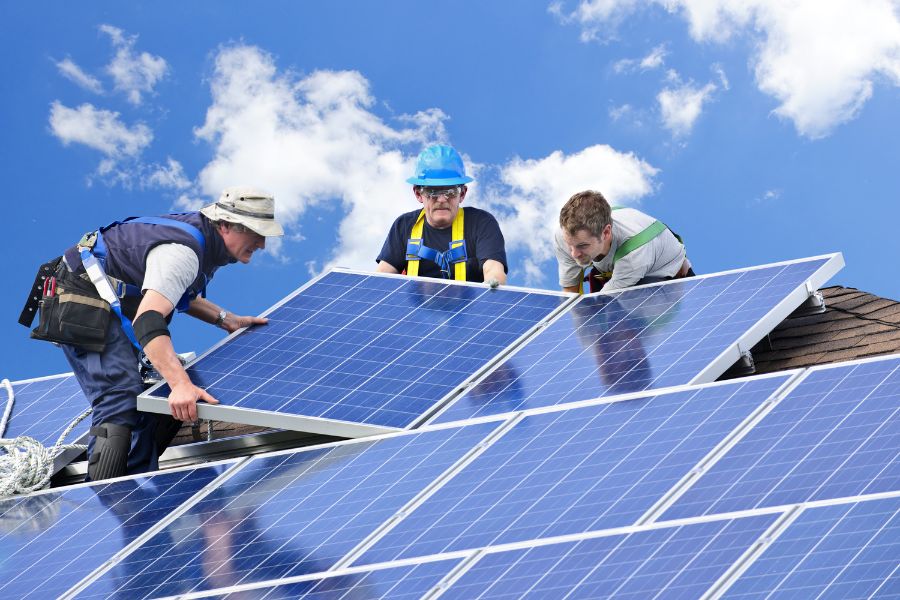
Solar panel installations have become a popular way for homeowners and businesses to harness renewable energy, reduce electricity costs, and increase energy independence. By converting sunlight into usable power, solar panels offer a sustainable solution to meeting energy needs while reducing environmental impact. This guide covers the benefits of solar panel installation, how to maximize energy efficiency with your system, and why solar power is a leading choice for renewable energy.
Benefits of Solar Panel Installation
Reduced Electricity Costs
One of the most significant benefits of solar panel installation is the potential for reduced electricity bills. Solar panels generate energy from sunlight, which can power your home or business, allowing you to use less electricity from the grid. By lowering your reliance on utility-provided electricity, you’ll see savings on your monthly bills, which can add up significantly over time.
Energy Independence
Solar panels provide a level of energy independence, reducing dependence on traditional power sources and protecting against rising electricity costs. By producing your own renewable energy, you’re less affected by fluctuations in electricity prices, making it easier to plan your energy budget.
Environmental Benefits
Solar energy is a clean, renewable source of power that doesn’t emit greenhouse gases or pollutants. By choosing solar, you contribute to a reduction in fossil fuel use, helping to lower carbon emissions and combat climate change. Solar panels also have a relatively low environmental impact in terms of production and installation, making them an eco-friendly choice.
Increased Property Value
Homes and businesses equipped with solar panels typically have higher property values, as energy-efficient features are attractive to buyers. Solar panel installations add appeal by offering long-term energy savings and demonstrating a commitment to sustainability. Many buyers are willing to pay more for properties with established renewable energy systems, which can offer an advantage in competitive real estate markets.
How Solar Panels Work
Solar panels are made up of photovoltaic (PV) cells, which convert sunlight into direct current (DC) electricity. An inverter then converts the DC electricity into alternating current (AC), which can be used to power your home or business. When solar panels generate more electricity than you use, the excess power can either be stored in a battery system or sent back to the grid, depending on your setup and local regulations. This continuous conversion process allows solar panels to provide consistent, renewable energy as long as there’s sunlight.
Maximizing Energy Efficiency with Solar Panel Installations
1. Optimize Panel Placement and Angle
The efficiency of your solar panels depends significantly on their placement and angle relative to the sun. For optimal energy production, panels should be positioned to receive the maximum amount of sunlight throughout the day, typically facing south in the Northern Hemisphere. Adjusting the tilt angle according to your geographical location and seasonal changes ensures that panels capture the most sunlight possible.
2. Use High-Efficiency Solar Panels
Solar panels vary in efficiency, with high-efficiency panels converting a larger percentage of sunlight into electricity. Although they may have a higher upfront cost, high-efficiency panels maximize energy production in limited spaces and provide more power for your investment. Look for panels with high efficiency ratings, such as monocrystalline panels, to get the most out of your solar system.
3. Incorporate a Battery Storage System
Adding a battery storage system to your solar setup allows you to store excess energy generated during sunny periods and use it when sunlight is limited, such as at night or on cloudy days. Battery storage enhances energy efficiency by reducing reliance on the grid and ensuring that you make full use of the energy your panels produce. Modern battery systems, like lithium-ion batteries, offer high storage capacity and durability, making them a valuable addition to any solar installation.
4. Monitor and Maintain Your System
Regular monitoring and maintenance are essential for maximizing the efficiency of your solar panels. Monitoring systems track energy production and alert you to any dips in performance, allowing for prompt troubleshooting. Cleaning your panels and checking for obstructions, such as tree branches, will also help maintain optimal energy production. In areas prone to dust or pollen, cleaning solar panels every few months ensures they receive the maximum amount of sunlight.
5. Upgrade to a Smart Inverter
A smart inverter, or advanced inverter, is designed to manage energy flow efficiently, supporting grid stability and enhancing the performance of your solar system. Smart inverters can adjust voltage and frequency, optimize energy production, and enable two-way communication between your system and the grid. This improves energy efficiency by ensuring that your solar panels operate at their best, regardless of changes in grid demand.
6. Take Advantage of Net Metering
Net metering is a billing arrangement that allows solar system owners to send excess electricity back to the grid in exchange for credits. When your panels produce more energy than you consume, the excess power flows into the grid, offsetting future electricity costs. Net metering helps you maximize energy efficiency by providing financial benefits for the renewable energy you generate, encouraging energy independence and reducing reliance on non-renewable sources.
7. Plan for Energy-Intensive Tasks During Sunlight Hours
By scheduling energy-intensive tasks, such as laundry, dishwashing, or charging electric vehicles, during peak sunlight hours, you can make the most of the electricity generated by your solar panels. This approach helps reduce demand on the grid, lowers electricity costs, and allows you to maximize the efficiency of your solar energy system.
Cost Considerations and Financial Incentives
Initial Installation Costs
The initial cost of solar panel installation varies depending on factors such as panel type, system size, and labor expenses. Although the upfront cost can be significant, it’s a one-time investment that pays off over time through energy savings and potential financial incentives.
Solar Tax Credits and Incentives
Many governments offer tax credits, rebates, and incentives to encourage solar adoption. For instance, the U.S. offers a federal solar tax credit that allows homeowners to deduct a portion of their solar installation costs from their taxes. Some states and local governments provide additional incentives, which can significantly reduce the cost of installation. Checking with local authorities and utility providers for available incentives can help make solar panel installation more affordable.
Return on Investment (ROI)
The ROI of solar panels depends on several factors, including system size, local electricity rates, and available incentives. In general, most solar systems pay for themselves within 5 to 10 years. With a typical lifespan of 25 to 30 years, this leaves several years of savings after the initial payback period. Calculating your estimated ROI based on energy savings and available incentives helps determine the long-term financial benefits of solar panel installation.
Environmental Impact of Solar Energy
Solar energy is a renewable and clean source of power that significantly reduces greenhouse gas emissions and dependence on fossil fuels. By generating electricity from sunlight, solar panels minimize pollution and contribute to a more sustainable energy future. Unlike coal or natural gas, solar energy doesn’t release harmful pollutants into the atmosphere, preserving air quality and reducing the effects of climate change. Choosing solar energy helps reduce carbon footprints and supports global efforts to transition toward clean, renewable energy sources.
Choosing the Right Solar Panel Installation Provider
Research Experience and Expertise
When selecting a solar panel installation provider, consider companies with extensive experience and a strong track record in the industry. Experienced providers are more likely to offer quality installations, follow best practices, and provide valuable insights into maximizing your system’s efficiency.
Compare Quotes and Services
Request quotes from multiple providers to compare pricing, warranties, and services. Some companies may offer additional benefits, such as maintenance packages, monitoring systems, or extended warranties, which can enhance the value of your installation. Be sure to evaluate each provider’s offer based on total value, not just the upfront cost.
Verify Licensing and Certifications
Solar panel installation requires specialized skills, so it’s essential to choose a licensed and certified installer. Look for certifications from reputable organizations, such as the North American Board of Certified Energy Practitioners (NABCEP), to ensure that the installer meets industry standards and adheres to safety regulations.
The Future of Solar Energy and Technological Advancements
As technology advances, the efficiency and affordability of solar energy continue to improve. Emerging innovations, such as bifacial solar panels (which capture sunlight on both sides) and transparent solar panels, are expanding the possibilities of solar power generation. Additionally, advancements in battery storage technology and energy management systems are making it easier for homeowners and businesses to store and use renewable energy effectively. With continuous advancements, solar energy is likely to become an even more integral part of the global energy landscape.
Conclusion: Embrace Solar Panel Installation for a Sustainable Future
Solar panel installation is a powerful way to harness renewable energy, reduce electricity costs, and enhance energy efficiency. From selecting high-efficiency panels to incorporating battery storage and utilizing smart inverters, there are numerous ways to optimize your solar system’s performance. With financial incentives, a solid return on investment, and a positive environmental impact, solar energy is an attractive solution for individuals and businesses looking to reduce their carbon footprint and achieve long-term energy independence. By choosing solar, you’re investing in a cleaner, more sustainable future for generations to come.
Frequently Asked Questions
How much can I save with solar panel installation?
Savings vary based on location, system size, and local electricity rates. Most homeowners save significantly on energy bills, with systems often paying for themselves within 5-10 years.
Are there tax credits available for solar panel installation?
Yes, many governments offer tax credits and incentives. In the U.S., the federal solar tax credit allows homeowners to deduct a percentage of installation costs, and additional local incentives may apply.
How often should solar panels be maintained?
Solar panels require minimal maintenance, usually needing a cleaning every few months. Regular monitoring and occasional professional inspections help ensure optimal efficiency.
What is net metering, and how does it benefit solar users?
Net metering allows you to send excess solar energy back to the grid for credits, reducing your electricity bill by offsetting future power consumption.
Can solar panels provide power during a power outage?
Solar panels alone do not provide power during outages unless paired with a battery storage system, which can store energy for use when the grid is down.







